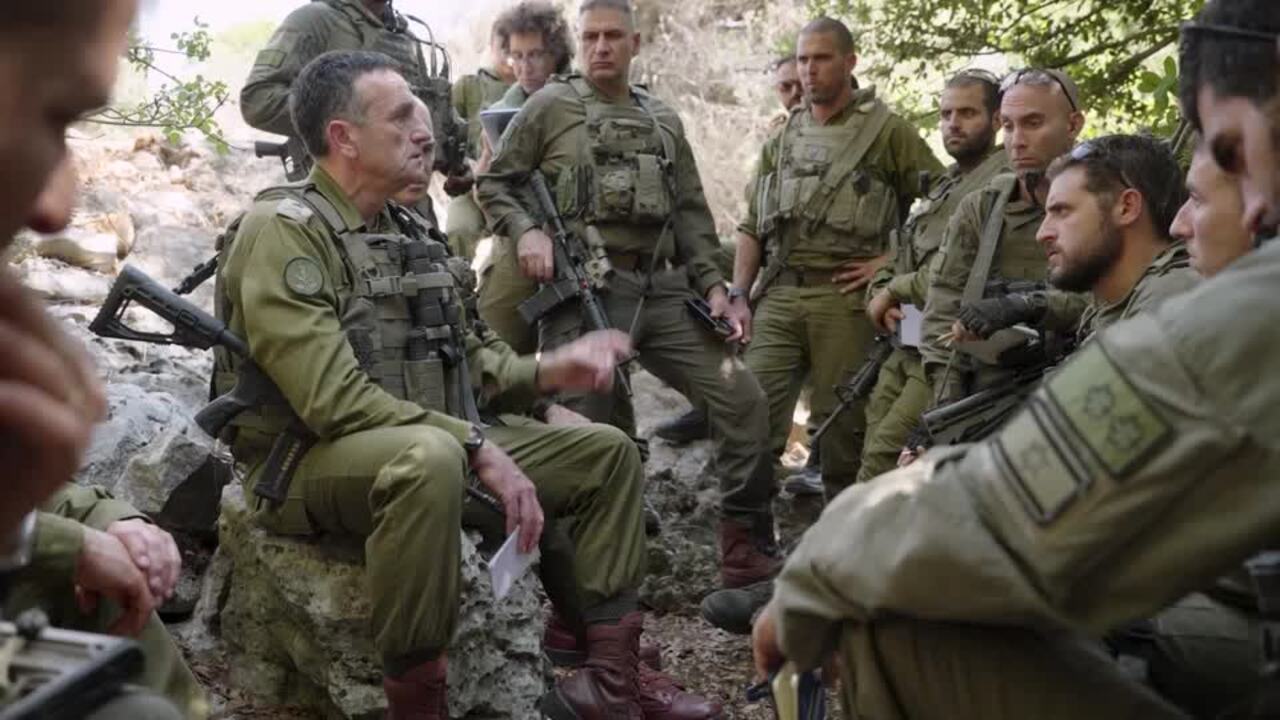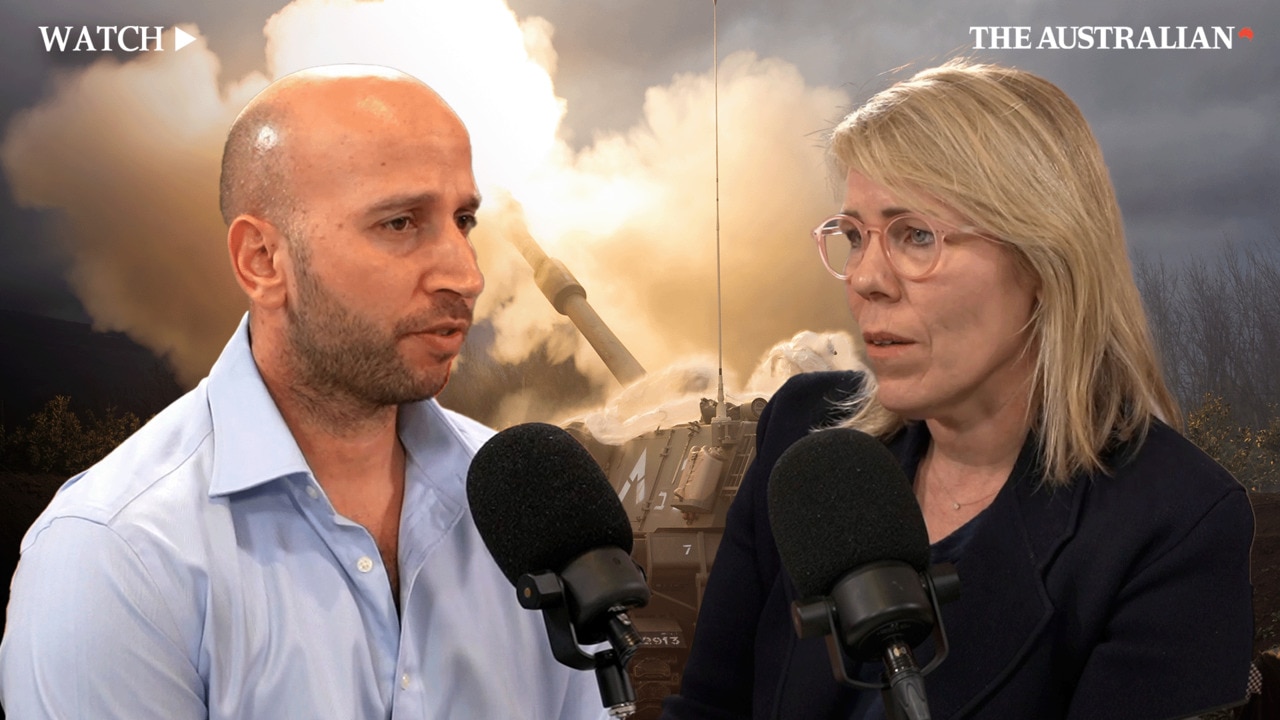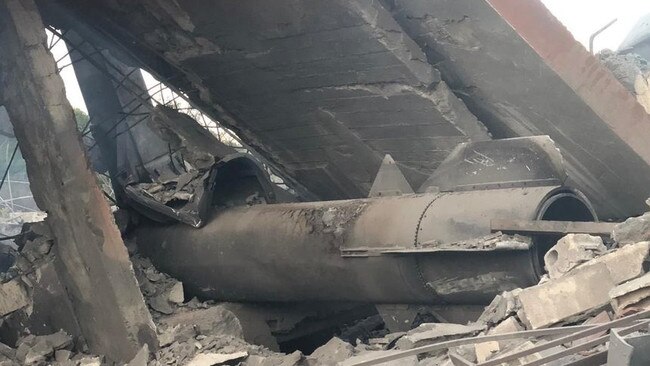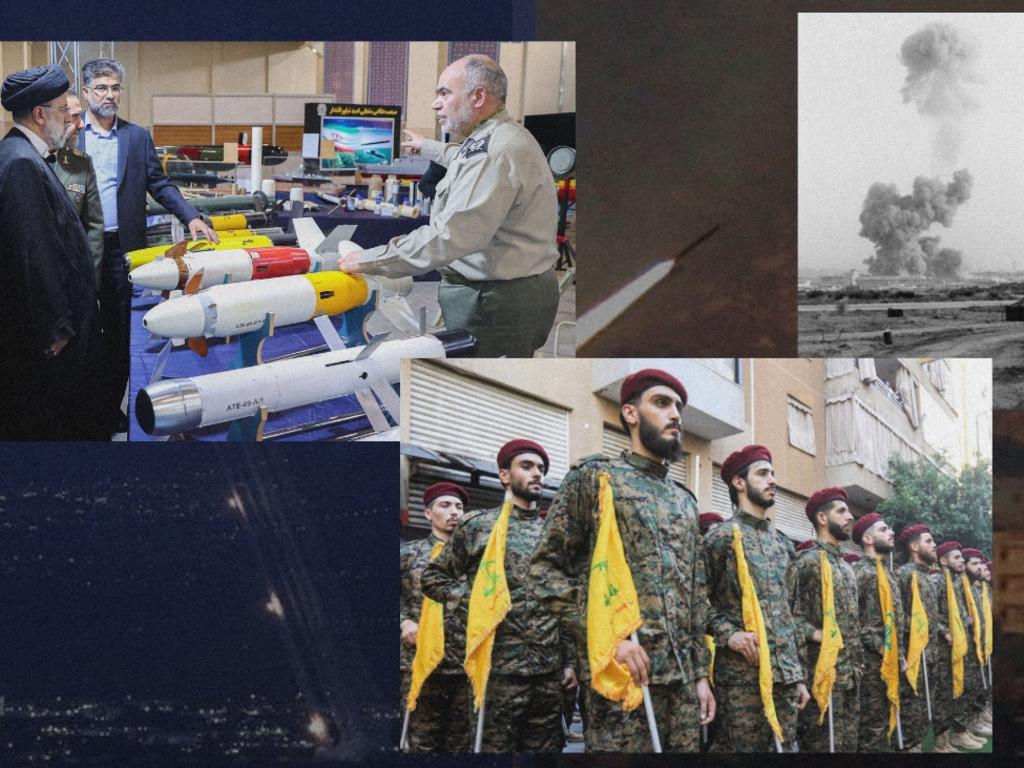Iran warns of ‘catastrophic consequences’ as IDF prepares for ground invasion
Iran has warned it will ‘back Lebanon with all means’ as Israel’s military chief tells troops to prepare for a potential ground invasion of Lebanon, amid a diplomatic push for a ceasefire.

Iran has warned of ‘catastrophic consequences’ if the conflict between Israel and Hezbollah escalates further.
On Thursday morning (AEST) Israel’s military chief told troops that air strikes against Hezbollah were in preparation for a potential ground invasion of Lebanon, after Israeli air defences intercepted the militant group’s first attempted missile strike on Tel Aviv.
“You hear the jets overhead; we have been striking all day. This is both to prepare the ground for your possible entry and to continue degrading Hezbollah,” the Israeli chief of staff, Herzi Halevi, told Israeli troops at the country’s northern border with Lebanon.
“We are preparing the process of a manoeuvre, which means your military boots, your manoeuvring boots, will enter enemy territory.”

His remarks came as the US, UK and France pushed for a pause in fighting, and amid confusion over whether Israeli Prime Minister Benjamin Netanyahu would greenlight peace talks.
As the Biden administration worked on a truce, French Foreign Minister Jean-Noel Barrot said the US and France were proposing a truce of 21 days “to allow for negotiations and a more sustainable ceasefire.”
“There has been important progress in the past few hours,” Barrot said. “We’ve been working since the start of the week in New York on a diplomatic solution with our American friends in particular.”
What you are watching is a UAV hitting a port in Eilat, Israel’s southernmost city.
— Israel Defense Forces (@IDF) September 25, 2024
This is what we mean when we say we’re fight a multi-front war. pic.twitter.com/QPV4NiMDHr
However Iranian Foreign Minister Abbas Araghchi warned that Tehran, which in recent weeks has held back on retaliatory strikes on Israel after attacks targeting Iranian interests, may no longer be restrained.
“The region is on the brink of a full-scale catastrophe. If unchecked, the world will face catastrophic consequences,” he told reporters, adding that in the event of escalation Tehran would back Lebanon “with all means” if fighting escalated with Hezbollah.
“The region is on the brink of a full-scale catastrophe. If unchecked, the world will face catastrophic consequences,” Mr Araghchi told reporters at the UN, adding that Iran would “stand with the people of Lebanon with all means.”
Despite reports that Mr Netanyahu - who will address the UN on Friday (AEST) - would greenlight peace talks, the Israeli military told local media they were not optimistic about a truce. Officials told Israel’s Channel 12: “There is no negotiation, the red line is to kick Hezbollah beyond the Litani (river).”

In Australia, Anthony Albanese said the government was “looking at options” including by air and water to help stranded Australians to flee Lebanon.
“I don’t know how many occasions I’ve now said that if people can get out they should through commercial airlines while it’s available,” the Prime Minister told Sky News.
“We’re looking at every option but there’s obviously national security issues, this is a war zone is going on here and it is appropriate that we not broadcast all of the contingencies that we’re putting in place, we’ve been meeting on this through our appropriate bodies over a period of time and including engaging with our friends and allies but we say, we repeat – as well – whilst people can get commercial aircraft they should and I find it remarkable that people are still staying there and that in recent months in spite of the warnings people have travelled into a zone which is very risky and that’s unfortunate that that has occurred,” he said.
The militant group’s attempted strike on Tel Aviv was its most provocative response yet to a week of punishing Israeli operations and air strikes that have underscored the growing risk of all-out war. Israel says strikes have targeted Hezbollah. The Israeli attacks have killed more than 500 Lebanese, including scores of women and children, and wounded some 2,000 others, according to Lebanese officials.
IDF: Following the surface-to-surface missile launch toward central Israel, the IAF struck the launcher from which the missile was fired in the area of Nafakhiyeh in Lebanon. pic.twitter.com/kPnMGfodhi
— Eylon Levy (@EylonALevy) September 25, 2024
The United Nations said Wednesday that more than 90,000 people have been displaced in the past three days, mainly from Lebanon’s south and northeast as well as the Bekaa Valley and Beirut’s southern suburbs. More than 100,000 Lebanese had already been forced from their homes by fighting in the past year, and some of them are now on the move again.

The missile aimed at Tel Aviv targeted the headquarters of Israel’s Mossad spy agency in the area. Though it was intercepted, alerts sent residents scrambling into shelters.
Hezbollah said that Mossad is responsible for the assassination of several of its leaders, as well as pager attacks on its members. The projectile used in the thwarted strike, the Qadr, is an Iranian-made medium-range missile.
That only one missile was used, and that it was targeting Mossad, suggests that the attack was intended to be a “symbolic retaliation rather than a formal declaration of war or a signal of intention to escalate to full-scale war,” said Lina Khatib, an associate fellow at Chatham House, an international-affairs institute in London.

To intercept the missile, Israel’s military said it used its David’s Sling air-defence system, which covers more range and can intercept larger projectiles than the Iron Dome, the system that has more often been used to shoot down smaller rockets launched by Hamas in Gaza. Tel Aviv is less than 100 miles from Israel’s border with Lebanon.
The Israeli military said Wednesday morning that it struck the launcher, in Lebanon’s south, that was used to fire toward Tel Aviv.
The military said it has been targeting Hezbollah military infrastructure and buildings it said housed weapons throughout the week, while warning Lebanese residents to avoid buildings connected to the militant group. The strikes Wednesday killed at least 22 people and wounded around 100 more, according to the Lebanese health ministry, which doesn’t distinguish between civilians and combatants. Hezbollah said four of its fighters were killed Wednesday.
Hezbollah has been firing rockets at northern Israel since Oct. 8, in what it says is solidarity with Palestinians in the Gaza Strip, and has said that it will stop when a ceasefire is reached in the enclave, where tens of thousands of Palestinians have been killed.
Here’s a glimpse inside of Hezbollah’s deadly terrorist organization. pic.twitter.com/jl8PsSQdZ6
— Israel Defense Forces (@IDF) September 25, 2024
Israel launched its war against Hamas in Gaza after the Hamas-led Oct. 7 attacks in southern Israel, which left approximately 1,200 people dead and saw around 250 taken hostage, according to Israel.
Israel’s military said Tuesday that an air strike killed Hezbollah’s top missile commander, Ibrahim Muhammad Qabisi, and two other missile commanders in the southern Beirut suburb of Dahiyeh. The military said Qabisi was head of the group’s missile and rocket force and was close to senior military leaders. Hezbollah, a U.S.-designated terrorist group, confirmed Qabisi’s death. Lebanon’s Ministry of Health said six people were killed and 15 wounded in a strike in the Beirut suburb.
The strike was another blow to Hezbollah, already reeling from the loss on Friday of its top military commander and elite Radwan commanders and the pager attacks that wounded many among its rank-and-file.
Roads were jammed as people fled southern Lebanon on Tuesday, according to people who arrived later in Beirut and other areas in central Lebanon, after the Israeli military launched the expansive air campaign at sunrise Monday and broadcast evacuation orders it said were designed to move civilians out of harm’s way. Many people were stuck overnight on the roads to Beirut, with some even returning home because of traffic jams. Airlines cancelled flights to and from Beirut’s international airport.

–
Many people who fled the south said the intensity of Monday’s bombing caught them by surprise, leaving them to jump into their cars and rush north without packing food, clothes or medicine. Some said that air strikes hit close enough to the coastal highway as they were driving north that their car windows shook and the smoke obstructed their view.
After harrowing drives of up to 22 hours, families packed into hotels, relatives’ homes and schools converted into shelters. Aid groups are struggling to meet basic needs in a country that is already suffering from a crippling economic crisis and political deadlock that has prevented the formation of a new government for two years. On Wednesday, they delivered bedding, medicine and other essential supplies.
Israel has sharply raised the intensity of its military operations against Hezbollah over the past week in hopes of persuading the militia to stop firing on Israel’s north, which would allow tens of thousands of displaced residents to return to their homes.
“I cannot detail everything we are doing, but I can tell you one thing – we are determined to return our residents in the north home safely,” said Israeli Prime Minister Benjamin Netanyahu. “We are inflicting blows on Hezbollah that it never imagined. We are doing it with might; we are doing it with stratagems. I promise you one thing – we will not rest until they return home.” The U.S. Defense Department believes the Israeli military isn’t in a position to launch a ground invasion now and that it would need to move more troops into place, according to people familiar with the matter, but also thinks that such an attack could come together in a matter of several days.
The U.S. and Arab governments are concerned the surge in fighting risks spiralling into an all-out war after nearly a year of lower-intensity fighting.
Monday’s strikes in Lebanon were by far the deadliest day of skirmishes in the current hostilities and the worst bout of bloodshed between Israel and Hezbollah since their monthlong conflict in 2006.
Dow Jones





To join the conversation, please log in. Don't have an account? Register
Join the conversation, you are commenting as Logout